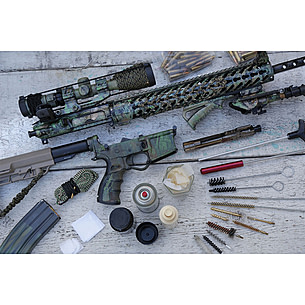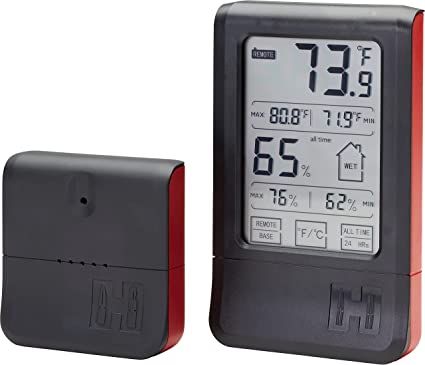Clean your rifle after every use or at least every few months if not in regular use. Neglecting maintenance can affect performance and safety.
Maintaining a rifle is crucial for ensuring its longevity, accuracy, and safety. Regular cleaning is a fundamental part of firearm care, as it prevents the build-up of residues and potential corrosion that could impair its function. For avid shooters, cleaning after each session is ideal to keep the rifle performing optimally.
Even for those who shoot less frequently, setting a routine for maintenance every couple of months is smart practice. This helps in preserving the integrity of the rifle’s components and ensuring it’s ready for action whenever needed. By adhering to these simple cleaning guidelines, gun owners can protect their investment and maintain a safe and reliable firearm. Remember, a well-maintained rifle is a shooter’s best ally in consistency and precision.

Credit: www.pelican.com
Assessing Rifle Use And Maintenance Needs
Understanding when to clean your rifle is key to ensuring its longevity and optimal performance. Not all rifles require the same maintenance schedule. This section will guide users through assessing their rifle’s cleaning needs.
Factors Influencing Cleaning Frequency
The frequency at which you clean your rifle depends on various factors. These include:
- Type of use: Hunting, target shooting, or tactical training.
- Frequency of use: Daily, weekly, or monthly shooting.
- Environment: Exposure to dirt, dust, and moisture.
- Ammunition used: Some ammo may leave more residue.
- Manufacturer’s guidelines: Always consider the recommendations.
Signs Your Rifle Needs Cleaning
Recognizing when your rifle requires cleaning is crucial. Look out for:
| Sign | Description |
|---|---|
| Accuracy Decline | If shots are inconsistent, cleaning may help. |
| Action Stiffness | A stiff action could benefit from a clean. |
| Visible Residue | Check for grime build-up in the barrel and action. |
| Unusual Sounds | Scrapping or grinding sounds can indicate dirt. |
| Foul Odor | A bad smell suggests potential rust or mold. |
Maintaining your rifle is non-negotiable for optimal performance. Follow these tips to keep your firearm in top condition.

Credit: www.opticsplanet.com
The Role Of Ammunition In Cleaning Schedules
The Role of Ammunition in Cleaning Schedules is crucial for rifle maintenance. Different types of ammo result in varying levels of residue. This impacts how often you should clean your firearm.
Corrosive Vs. Non-corrosive Ammo
Corrosive ammunition often contains salts. These salts attract moisture and lead to rust. Non-corrosive ammo, on the other hand, is much less likely to cause such damage. Identify the ammo type before deciding on a cleaning routine.
| Ammo Type | Cleaning Frequency |
|---|---|
| Corrosive | After each use |
| Non-Corrosive | Less frequent |
Ammunition Residue And Barrel Health
Residue build-up can hurt your rifle’s accuracy. Each shot leaves behind particles. Let’s break down the outcomes:
- Accuracy declines: Residue affects bullet trajectory.
- Barrel wears out: Particles can scratch the barrel.
Clean regularly to remove particles and protect your rifle’s barrel health.
Cleaning After Specific Activities
Gun owners know that proper rifle maintenance is key for performance. It’s not just about cleaning; it’s about when and how to clean. This guide dives into the essential routines after specific activities that can impact your rifle’s longevity and accuracy.
Post-hunting Cleaning Rituals
Hunting exposes rifles to the elements. Dirt, moisture, and debris can take a toll. As soon as the hunt ends, perform these steps:
- Disassemble your rifle according to the manufacturer’s instructions.
- Use a cleaning rod and patch to remove residue from the barrel.
- Inspect all parts for damage or excessive wear.
- Wipe down the exterior with a cloth to remove moisture and dirt.
- Reapply gun oil lightly to prevent rust.
- Ensure the rifle is dry and clean before storage.
Range Day: A Cleaner’s Guide
A day at the range means lots of shooting and residue build-up. Follow these steps:
- Cool down your rifle before cleaning.
- Strip it down based on the manual’s directions.
- Brush the barrel with a bore brush then swab with patches.
- Clean the action with a solvent and a brush.
- Examine for wear and replace parts if needed.
- Dry and reassemble your rifle.
- Finish with a protective oil layer.

Credit: www.nytimes.com
Seasonal And Long-term Storage Considerations
As the seasons change, so do your rifle cleaning needs. Proper maintenance ensures reliability when it’s time to shoot again. Here’s how to get your rifle safely stashed away.
Preparing Your Rifle For Storage
Before storing your rifle, take these steps:
- Disassemble your firearm if the manufacturer recommends it.
- Clean each part with the right tools and solvents.
- Lubricate to prevent rust. Use a light oil film on metal parts.
- Protect the bore with a bore-specific preservative.
- Inspect for wear or damage. Fix issues before storage.
- Use a gun sock or a silicone-treated cloth for extra protection.
Ideal Conditions To Preserve Your Firearm
To keep your rifle safe long-term, remember:
| Condition | Ideal Setting |
|---|---|
| Humidity | Keep below 50% to prevent rust. |
| Temperature | A stable, cool environment works best. |
| Case | Opt for breathable storage, avoid sealing in foam cases. |
| Position | Store horizontally to avoid pressure on any end or upright in a rack. |
Remember to check on your firearm periodically. Even in storage, it needs a quick maintenance look.
Step-by-step Cleaning Process
Keeping your rifle in prime condition is key for accuracy and longevity. A clean rifle ensures reliable operation and safety. This detailed step-by-step process will guide you through the necessary steps to maintain your firearm’s performance.
Disassembly And Safe Handling
Before cleaning your rifle, always ensure it is unloaded. Point the muzzle in a safe direction while handling. Remove the magazine and pull back the bolt to inspect the chamber. Once cleared, follow your rifle’s manual for disassembly. Handling your firearm safely is crucial during disassembly.
Tools And Solvents For A Thorough Clean
Use the right tools and solvents for an effective clean. A basic rifle cleaning kit should include:
- Cleaning rod – To push patches through the barrel
- Bore brush – For removing copper buildup
- Patches and patch holder – To swab the bore
- Cleaning solvent – To dissolve fouling
- Lubricating oil – To protect metal parts from rust
Remember to wear gloves to protect your hands from harsh chemicals. Consult your rifle’s manual for the recommended solvent.
- Run bore brush – Begin by running the bore brush through the barrel to loosen up fouling.
- Apply solvent – Soak a patch in cleaning solvent and pass it through the barrel with the cleaning rod.
- Wipe down – Use a clean patch to wipe down the barrel and receiver.
- Lubricate – Apply a thin coat of oil on all moving parts.
- Reassemble – Once dry, reassemble your rifle carefully.
Each step is essential in the rifle maintenance routine. Regular cleaning after use prolongs the life and precision of your firearm.
Common Rifle Cleaning Mistakes To Avoid
Cleaning your rifle is crucial for accuracy and longevity. Mistakes during the cleaning process can harm your firearm and affect performance. It’s important to learn the common errors to maintain your rifle properly.
Overcleaning And Undercleaning: Finding The Balance
Both extremes in rifle care can lead to issues. Overcleaning can wear down barrel integrity and components. Undercleaning can cause build-up and reduce function. A good rule is to clean after each use or every few sessions if shooting is light. Regular maintenance after long periods or exposure to harsh elements is essential.
Harmful Techniques That Can Damage Your Rifle
- Using inappropriate tools: Stick to recommended cleaning rods and brushes.
- Excessive oil: Apply only a thin film to avoid residue build-up.
- Skipping barrel cleaning: Use a bore guide to protect the rifle’s throat.
- Forgetting to check the manual: Your rifle’s manual outlines optimal cleaning methods.
- Ignoring wear signs: Check parts while cleaning to catch issues early.
Frequently Asked Questions Of How Often Do I Need To Clean My Rifle
Do I Need To Clean My Rifle After Every Use?
Yes, you should clean your rifle after each use to maintain accuracy and extend its life. Regular cleaning removes residue, prevents corrosion, and ensures safe operation.
How Long Can A Rifle Go Without Being Cleaned?
A rifle typically requires cleaning after every use or at least every few months to maintain its function and accuracy. Neglecting maintenance can lead to build-up and corrosion, affecting performance.
What Happens If You Don’t Clean Your Rifle?
Neglecting to clean your rifle can lead to accuracy issues, malfunctions, and potentially irreversible damage to its components due to buildup of residue and corrosion. Regular maintenance ensures safe and reliable firearm operation.
How Often Should You Clean An Ar 15?
Clean your AR-15 after every use or at least every 250-300 rounds to maintain performance and safety. Regular maintenance after prolonged storage or exposure to harsh conditions is also essential.
Conclusion
Consistent rifle cleaning is key for optimal performance and safety. Aim for a routine clean after every use or at minimum, bi-monthly. This ensures longevity and reliability of your firearm. Remember, a well-maintained rifle is a shooter’s best friend on the range or in the field.



